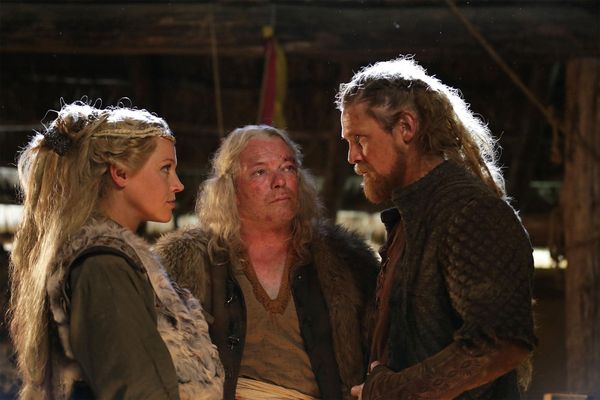Eye For Film >> Movies >> Redbad (2018) Film Review
Redbad
Reviewed by: Jennie Kermode

In most of the countries where this film is seen, viewers will likely never have heard of Redbad. In the Netherlands and northern Germany, especially among supporters of the Frisian independence movement, he's a familiar name, but there's still not a great deal known about his story. Something of a political inconvenience in the years after his death, he was quietly omitted from records, and some sources even suggest that information about him was destroyed. All this is quite convenient for a hero - fans are largely free to project onto him what values they like. It also offers plenty of potential for a film, though the Redbad we meet here is a less consistent figure, at times too complex to fit the hero mould, at times too heroic to be convincing as a man.
The 8th Century was a time of significant religious tension in northern Europe as the new Middle Eastern god sought to supplant those native to the region. Neither side is portrayed here in a flattering manner, at least not from the point of view of a modern audience. The Vikings practise human sacrifice, partly in an attempt to ensue good harvests and military victories, partly for political expedience - the public gets what the public wants. The Christian Franks consider themselves more civilised but are not averse to a spot of torture or wife beating and have no qualms about slaughter in battle. They use a shield wall technique that relies on cooperation, but they're ill-disciplined. The Vikings mostly rely on running at their enemies whilst roaring a waving swords, a technique that worked well for them for several centuries (though better with axes). Somewhere in the midst of all this, Redbad finds himself wondering about philosophy and strategy and better ways of doing things. He's remembered as a warrior, but as with Genghis Khan or Robert the Bruce, it's really his intellect that matters.

Gijs Naber carries the central role well but the role doesn't always fit with the film, which demonstrates that uncertainty of pacing and purpose all too common when an action director takes on a biopic. Director Roel Reiné seems caught between attempts at realism and playing to the crowd. His battle sequences tell an interesting story, initially chaotic, later sharpening up and becoming tactically intriguing as Redbad develops a clearer idea of what he's doing and starts to innovate. That much of what we see involves warriors simply straining and flailing against each other is entirely realistic but it means that the early conflicts offer limited satisfaction for the viewer. By contrast, the final battle scene is stagy in the extreme. Redbad's emotional journey and developing political awareness are approached in a similar way.
There's some great moody cinematography on display here but large stretches of the film are desaturated, a technique that's popular with filmmakers working on low budgets who want to look stylish but which has, by way of that popularity, come to look tedious and cheap. Most of what's included in these sections could be cut and the film would be no poorer for it - indeed, at nearly three hours long, it could really do with an editor. It would be easier to connect with Redbad's character and passions if the film were not trying to cover every conflict in his career, most of which contribute little to the sense of story. It's more successful in its intimate moments, when dealing with small numbers of characters and giving us room to get to know them. Loes Haverkort and Lisa Smit make an impression as the two women in Redbad's life, as fierce in battle as any of the men, but some of the actors are at the best when standing at the back and not speaking.
What makes this film significant beyond its focus on a neglected European hero is its treatment of his religious ideas. Without wanting to give too much away, one might note that this could lead to it having problems getting screened in parts of the US. Epic heroes making the particular impassioned arguments that Redbad does here have been absent from cinema for most of its history, judiciously ignored as Redbad was by those who came to power after he died, and it's good to see that their time has finally come - cinema is, with this film, a little closer to growing up and looking squarely at the world in all its diversity.
This is a film that has some thrilling moments, for all that it falls short of its potential. It's unlikely to have the same political impact as Braveheart but neither does it share that film's egregious technical failings or sensationalism. Reiné has tried hard to deliver a historically congruent tale. He has succeeded in bringing an interesting man back into the public eye, and many viewers will leave this film wanting to learn more.
Reviewed on: 08 Sep 2018















